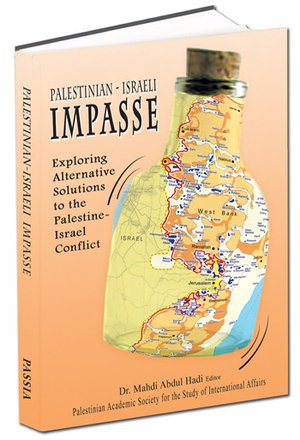Palestinian - Israeli Impasse - Exploring Alternative Solutions to the Palestine Israel Conflict
The papers included in this volume look at the reasons the two-state solution
has failed to succeed until the present day and con sider what prospects for
future success or failure it still has, thereby looking at the issue from various
angles (historical, conceptual and religious aspects; implications for the refugee question, Jerusalem, the settlement issue and the future geography of
Pales tine/Israel). The various proposed approaches to solve the Palestinian/Israeli impasse explored in this volume were provoked by a number of
concrete questions, such as whether there is still a possibility for a (short-term or permanent) two-state solution; how the two-state solution should
be reevaluated, given that all recent breakthroughs in the reconciliation
process of inter-communal or ethnic disputes (e.g., Northern Ireland, South
Africa) have been based on federal, consociational, and autonomy arrangements, and not on partition; and what kind of practicable models could be
envisioned for the Palestinian-Israeli case.
Overview
In 2004, when it became clear that Palestinian-Israeli relations had reached a deadlock – there had not been any serious negotiations for over three years, an “Intifada culture” was prevailing, and daily lives were determined by the Israeli re-occupation of Palestinian cities, military incursions, and closure policies - PASSIA initiated a new project entitled Palestinian-Israeli Impasse - Exploring Solutions to the Palestine-Israel Conflict, in a search for the light at the end of the tunnel.
Stuck in a conflict that has been continuing for more than a hundred years, in which scores of mediators and proposals were unable to deliver a solution, and left with the equally unsuccessful more recent initiatives (e.g., the Clinton parameters of 2000, the Taba talks of 2001, the road map of 2002-3, the Nusseibeh-Ayalon Plan and the Geneva Accords of 2003), common analysis had it that it was becoming increasingly likely that confrontation and bloodshed would continue and even intensify in the absence of any practicable alternatives.
As also the international community had proven unable to bring about a settlement consistent with international law and UN resolutions, an increasing number of voices claim that the two-state solution – a viable Palestinian state alongside Israel as pursued in various forms over the last five decades – had been effectively pre-empted by the deliberate policies and strategies of recent Israeli governments.
Against this background, PASSIA embarked on this project with the intention to promote serious dialogue and discussion about the various options facing the two communities over the course of the next few years, and to examine whether, or to which degree, the two-state consensus is “dead,” what lies ahead if the status quo would last for another ten years, and what alternative proposals could or should be considered. The project combined research (position papers) and dialogue sessions (roundtables in which the papers were presented and discussed) with an array of Palestinian scholars, intellectuals, members of government and of various political factions, NGO activists, and professionals as well as Israeli academics and activists.
The papers included in this volume look at the reasons the two-state solution has failed to succeed until the present day and consider what prospects for future success or failure it still has, thereby looking at the issue from various angles (historical, conceptual and religious aspects; implications for the refugee question, Jerusalem, the settlement issue and the future geography of Palestine/Israel) .
The various proposed approaches to solve the Palestinian-Israeli impasse explored in this volume were provoked by a number of concrete questions, such as whether there is still a possibility for a (short-term or permanent) two-state solution; how the two-state solution should be reevaluated, given that all recent breakthroughs in the reconciliation process of inter-communal or ethnic disputes (Northern Ireland, South Africa, Bosnia) have been based on federal, consociational, and autonomy arrangements, and not on partition; and what kind of practicable models could be envisioned for the Palestinian-Israeli case.
For those papers that support the idea of a one-state solution, the possibilities of maintaining separate cultures, heritages and identities while holding equal citizenships and rights in a democratic political system on one open territory are considered very seriously. By exploring these and related issues, the PASSIA team aimed to assess the positions adopted by different national, religious, secular and other groups on the various formulas as well as the greatest obstacles to each of them.
It is hoped that this volume will further contribute to the objectives of the project, which were to stimulate debate among people from different backgrounds and political affiliations on alternative agendas to overcome the current status quo and provide a forum for open discussion and exchange on those and related topics.
Jerusalem, May 2005
Dr. Mahdi Abdul Hadi (Editor)
Head of Passia

